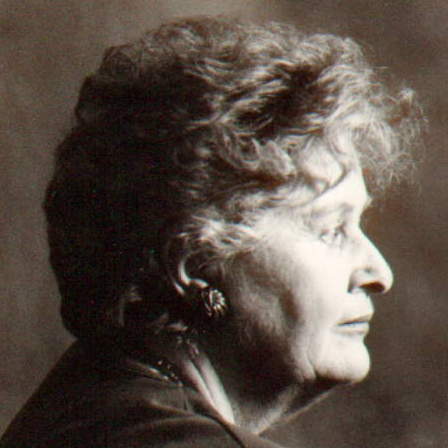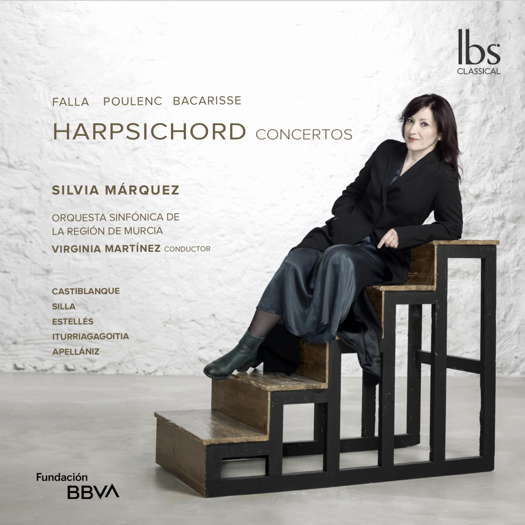- Steven Block
- Cala Signum
- Eterio Stinfalico
- Mario Trabucco
- Hansheinz Schneeberger
- Bill Strayhorn: Take the A Train
- Franco Alfano
- Gershwin: Rhapsody in Blue
 UPDATES: There's a new feature every day at Classical Music Daily. Read about the various ways we can keep in touch with you about what's happening here.
UPDATES: There's a new feature every day at Classical Music Daily. Read about the various ways we can keep in touch with you about what's happening here.
 SPONSORED: An Integral Part - Lindsey Wallis looks forward to the Canadian Music Centre's tribute concert to composer Roberta Stephen.
SPONSORED: An Integral Part - Lindsey Wallis looks forward to the Canadian Music Centre's tribute concert to composer Roberta Stephen.
All sponsored features >>

Suggestive Interweavings
Twentieth century harpsichord concertos by Falla, Poulenc and Bacarisse, heard by GERALD FENECH
'... a highly enjoyable issue, full of imaginative music ...'
Born in 1876 in Cádiz, Manuel de Falla is the greatest Spanish composer of the twentieth century. His education began with piano lessons and, aged twenty, he moved to Madrid, where he studied with Jose Prago and Felipe Pedrell. In 1904 he won the Real Academica de Bellas Artes competition with his opera La vida breve. In 1907 he went to Paris and was welcomed by Debussy and especially Dukas, and it was in this city that he composed one of his most famous works, the piano concerto Nights in the Gardens of Spain.
With the outbreak of World War I he returned to Spain, where in 1916 Diaghilev asked him to write a ballet for his Ballets Russes. The end result was The Three-Cornered Hat, a work of undying popularity and as fiery as any flamenco dance. It was produced in London in 1919 to great critical acclaim. Choreography was by Massine and design by none other than Pablo Picasso. Following the death of his parents in that same year, de Falla settled in Granada and remained there until the end of the Civil War in 1939. In this beguiling city he composed some of his most important works, the Harpsichord Concerto on this disc being one of them. A delightful piece this, full of exquisite charm that dates from 1926.
Listen — Manuel de Falla: Allegro
Concerto for Harpsichord, Flute, Oboe, Clarinet, Violin and Cello
(track 1, 0:02-0:58) ℗ 2021 IBS Artist :
De Falla finally settled in Argentina, where he died in 1946 aged nearly seventy, leaving unfinished his great oratorio Atlántida.
Francis Poulenc (1899-1963) was the only son of a prosperous manufacturer. Largely self-educated musically because he was not allowed to enrol at a music college, he studied with pianist Ricardo Vines, who became his mentor after the death of his parents. Poulenc also made the acquaintance of Erik Satie, under whose influence he became one of the group Les Six.
In his early works Poulenc became known for his high spirits and irreverence. During the 1930s a much more serious side to his nature emerged, particularly in the religious music he composed from 1936 onwards. In his later years and for many after his death, Poulenc had a reputation, particularly in France, as a humorous lightweight composer, and his religious music was often overlooked. In the 21st century more attention has been given to his serious works, and today creations such as Dialogues des Carmélites and La voix humaine have attained the popularity they deserve, especially through recorded performances, of which Poulenc was a great believer.
Poulenc died of a fatal heart attack on 30 June 1963, leaving behind a substantial oeuvre that includes songs, solo piano works, church music, choral pieces, operas, ballet and orchestral concert music.
His Concert Champêtre remains one of his best works for its ingenious orchestration and melodic invention, and the piece has always been in the repertoire of the harpsichord since the year of its composition (1928).
Listen — Poulenc: Presto (Concert champêtre)
(track 6, 0:02-1:02) ℗ 2021 IBS Artist :
Salvador Bacarisse (1898-1963) was born in Madrid and studied music at the Real Conservatory. He was a leading member of the Grupo de los Ocho (founded in the spirit of Les Six to combat musical conservatism), and helped to promote new music as artistic director of Union Radio until 1936. At the end of the Spanish Civil War in 1939, Bacarisse exiled himself to Paris. From 1945 until his death he worked for French Radio and Television as a broadcaster of programmes in the Spanish language.
Bacarisse composed for the piano, mixed chamber ensembles, opera and the orchestra. Among the latter genre one finds four piano concertos, a violin concerto, the famous Guitar Concertino Op 72 and the harpsichord concerto included on this recording. There is much to enjoy in this Concerto for Harpsichord and Small Orchestra, Op 124 (1960-61), written in a neoclassical style.
Listen — Bacarisse: Grave (Concerto pour clavecin et petit orchestre)
(track 8, 0:02-0:54) ℗ 2021 IBS Artist :
These three harpsichord concertos were all composed in the twentieth century. But apart from the concertos themselves this CD offers suggestive interweavings. The pieces by de Falla and Poulenc were both written for Landa Landowska (1879-1959), the great Polish harpsichordist, not only as an ancient instrument but also as a source of inspiration for twentieth century musicians. Poulenc's concerto is the immediate heir of de Falla's. Accordingly, in the orchestral score of Poulenc's concerto belonging to de Falla, one can read the following autograph dedication by the French composer: 'For you my dear Falla, the little brother of your so magnificent concerto. F Poulenc.'
The three concertos share a neo-classical aesthetic, albeit from different approaches; in his concerto de Falla explores and uses the ancient sources of Hispanic music, Poulenc evokes the French baroque and Bacarisse adopts stylistic elements typical of the neoclassicism of the 1920s.
Listen — Bacarisse: Allegro (Concerto pour clavecin et petit orchestre)
(track 9, 4:01-5:00) ℗ 2021 IBS Artist :
This is a highly enjoyable issue, full of imaginative music that makes its bow not that often. Rewarding stuff after repeated listenings, so approach with caution.
Copyright © 10 January 2022
Gerald Fenech,
Gzira, Malta

CD INFORMATION: HARPSICHORD CONCERTOS
CLASSICAL MUSIC ARTICLES ABOUT SPAIN
CLASSICAL MUSIC ARTICLES ABOUT FRANCE


